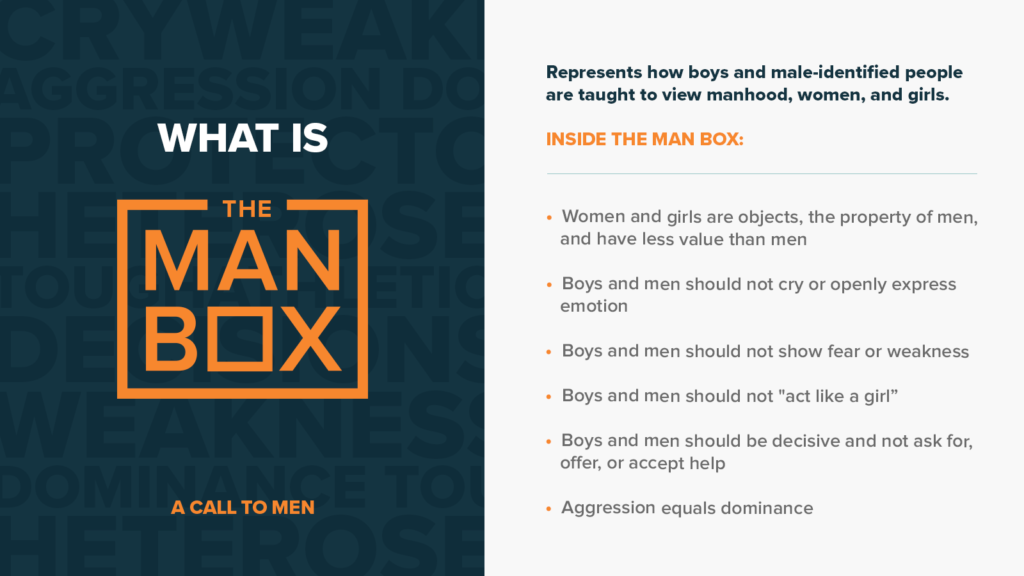The Man Box and Male Suicide
September is National Suicide Prevention Month — and a good reminder that everyone can help prevent suicide. According to the American Foundation for Suicide Prevention, in 2017, men died by suicide nearly four times more often than women, with white males accounting for almost 70 percent of suicide deaths that year, followed by American Indians and Alaska Natives. With the overwhelming number of suicidal deaths occurring among men, what makes it so hard for us to reach out for help?
Men are socialized not to ask for, offer, or accept help. It is one of the primary teachings of the Man Box — to always be in control and to never show weakness. The Man Box is a graphic representation of the collective socialization of men. It represents the unwritten rules, messages, and behavioral examples of how we are taught to be as men. When we live our lives according to these rigid rules, there are consequences. When we feel weak, overwhelmed, hopeless, and helpless, the Man Box does not afford us space to address these feelings in healthy and assertive ways. In fact, the Man Box teaches us that we should avoid or deny that we are impacted at all by our circumstances. Acknowledging the need for help and being willing to ask for it are examples of stepping outside of the Man Box.

This month let’s be intentional about reaching out to friends who might be exhibiting some signs of concerning behavior. Those could include:
-
Hopelessness, feeling like there is no way out
-
Anxiety, agitation, sleeplessness, or mood swings
-
Feeling like there is no reason to live
-
Rage or anger
-
Engaging in risky activities without thinking
-
Increasing alcohol or drug use
-
Withdrawing from family and friends
If you notice anyone experiencing signs of concerning behavior, reach out and offer support. You can:
-
Start a conversation. Mention the signs that prompted you to talk to them. Stay calm and let the person know you want to help them.
-
Listen, express concern, and reassure the individual. Let the person know you care and that you take the situation seriously. Letting the person know you care will go a long way in establishing a support system.
-
Create a safety plan. Ask the person if they have access to anything that could harm them and call for help if you feel the situation is dangerous.
-
Offer professional help and resources. Call the National Suicide Prevention Lifeline at (800)-273-8255. If you feel the situation is severe, take the individual to the closest emergency room or call for help.
If you are experiencing any of the feelings listed above, know that you can reach out for help. Talk to a trusted friend or text the counselors at Crisis Text Line. Everyone can make some simple, yet effective, lifestyle changes that can help alleviate these harmful thoughts and behaviors. These can include exercising, taking time off work, and spending time with friends and family to avoid isolation. Ultimately, anyone at risk or feeling uneasy should talk to a health care provider.
Showing compassion and care for others is a great way to step outside of the Man Box. If we truly are our brothers’ keepers, we need to practice creating opportunities for the men in our lives to be vulnerable with us and express their struggles in ways that do not result in shame or judgement. Redefining the ways that men have relationships with one another gets us closer to a greater and safer community for all of us.